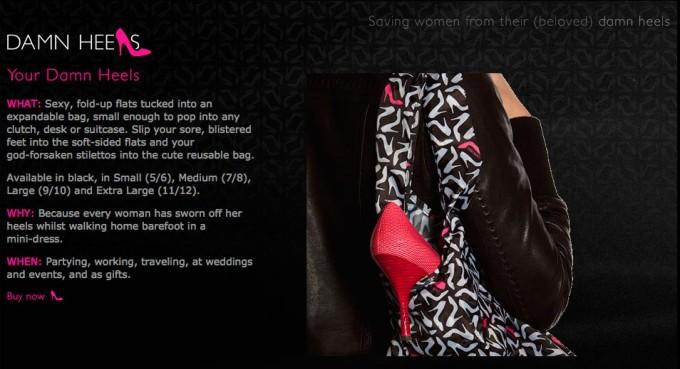By Ian Vandaelle
Hailey Coleman hit gold last year with Damn Heels, a foldable shoe product that won $25, 000 from Ryerson’s Slaight Communications Business Plan Competition (BPC).
But there have been a number of similar products released in the past year, including the recent release of Dr. Scholl’s foldable flats, Fast Flats. The product, which is similar in design and portability to Coleman’s product, is being heavily advertised, something that Coleman sees as help building a market for her product.
“It’s helping us move forward with the brand, and hopefully reach more clients then we have before,” Coleman said in a phone interview.
Coleman has no plans to pursue a lawsuit against Dr. Scholl’s, as she does not hold a copyright for her flats. “I’m not planning any legal action against [Dr. Scholl’s],” Coleman said. “I have a copyright on the patterned bag, but nothing on the flats themselves,” Coleman said, “Though I had the option for a patent, it wouldn’t offer much protection, as there are similar products now on the market.”
Ariel Katz, a University of Toronto professor who specializes in competition law and intellectual property law, said Coleman has no legal recourse as she failed to apply for a patent.
Katz also said that even if she had applied for a patent, she may not have received one due to stringent patent applications that certify if the product is new, useful and isn’t so obvious that it has been done many time before. “The idea of folding something up to put it in your purse is not new and is probably obvious,” Katz said.
Katz also said that had Coleman received a patent, it may have only applied to a very narrow aspect of innovation.
“If she did improve or do something that the previous product did not do, then she might have had a claim on that particular improvement,” Katz said. “It could be very narrow, and could mean that she could only prevent people from using the improved version.”
Other companies haven’t taken the same legal line as Coleman. Two American companies that offer similar products, Footzyrolls and Aftersoles, have been embroiled in a legal battle due to their similar products. Footzyrolls sued Aftersoles for trademark infringement, trade class infringement and unfair competition because both companies market flats that relieve feet after a night in high heels.
One of the first companies to market foldable shoes was Rollasole in England, who now sell the shoes in vending machines in nightclubs in both England and the U.S. Coleman said she has no plans to sell Damn Heels in vending machines.
“I don’t think the North American market is ready to start buying all sorts of things out of vending machines,” Coleman said. “In Europe and Asia, they have vending machines for almost everything here in North America, you just go to the vending machine to get a pop or something.”
Coleman said she has plans for expansion into international markets, but declined to say where she saw Damn Heels being sold next.
“There’s interest outside North America, but I’d rather not say where just yet,” Coleman said. On top of the BPC award, Coleman also appeared on CBC’s Dragon’s Den, sparking a bidding war for her product.
She eventually settled on $50,000 for 5% royalties from investor Arlene Dickinson. Coleman said that the deal should go through soon, pending Dickinson completing due diligence on the investment.












Leave a Reply